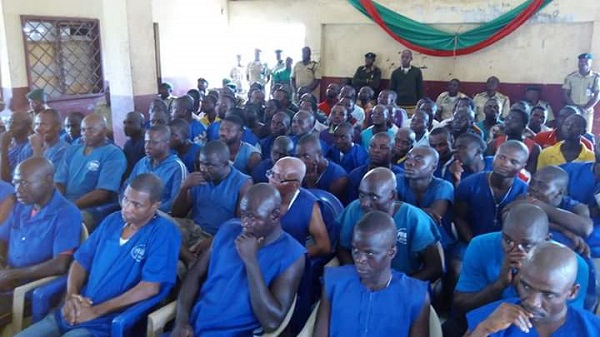Between January and September 2024, more than 1,450 prisoners in Nigeria’s detention facilities received amnesty as part of continuous attempts to reduce the number of detainees occupying the nation’s jails.
This action comes after a larger campaign that saw the Federal Government release 4,068 prisoners in November 2023—mostly individuals who had been detained because they were unable to pay fines. The N585 million that corporate entities donated as part of their corporate social responsibility program went towards funding the project.
A number of state governors and Chief Judges were instrumental in winning the release of prisoners during the first nine months of 2024. Notably, on New Year’s Day, 96 prisoners were released by the governors of the states of Benue, Nasarawa, Gombe, and Taraba.
A non-governmental organisation called the Headford Foundation helped 628 wrongly imprisoned prisoners be released from correctional facilities located in the states of Lagos, Ekiti, Delta, Ogun, and Rivers on March 19.
Following these releases, Oyo State Chief Judge Justice Iyabo Yerima pardoned 38 prisoners on March 20.
Governor Bala Mohammed of Bauchi State released 96 prisoners on March 22, and Chief Judge Simeon Chibuzor-Amadi of Rivers State liberated 24 prisoners from the Port Harcourt Maximum Custodial Centre the same month.
Dikko Radda, the governor of Katsina State, successfully negotiated the release of 222 prisoners on April 9 by paying their fines.
49 prisoners were granted mercy by Justice Mosunmola Dipeolu, the Chief Judge of Ogun State, on April 29 and 30.
Caleb Mutfwang, the governor of Plateau State, released 13 prisoners on May 29. Dapo Abiodun, the governor of Ogun, and Uba Sani, the governor of Kaduna State, pardoned 41 and 110 prisoners, respectively. The pardons continued into May.
On September 12, after a two-day visit to three correctional facilities in Yola, the state capital, Adamawa State Chief Judge Justice Hasfat Abdulrahaman released 156 prisoners. This was the most recent wave of releases.
The Nigerian Correctional Service has expressed concerns regarding the stigmatisation experienced by former offenders in light of these developments.
Speaking to reporters, NCoS spokesperson Umar Abubukar underlined how discrimination in society frequently impedes rehabilitation efforts and drives reformed criminals back into the criminal world by limiting their access to civil rights, political, and employment prospects.
“In most communities, ex-offenders are stigmatised, and this makes a mockery of the reformation they had undergone while in custody.
“Most ex-offenders are not given equal chances in employment, politics, and even in exercising their franchise and civic responsibilities,” he stated.
In addition to being a moral failure, he cautioned that stigmatisation constituted a security risk since it hindered ex-offenders’ ability to reintegrate into society and advance the interests of the country.
In his appeal for public support of the NCoS’s rehabilitation initiatives, Abubakar emphasised that society will ultimately gain from having a hospitable atmosphere for ex-offenders.
“May I use this medium to call on the public to refrain from any act of stigmatisation of ex-offenders, as they are doing more harm to the society than good,” Abubakar cautioned.




